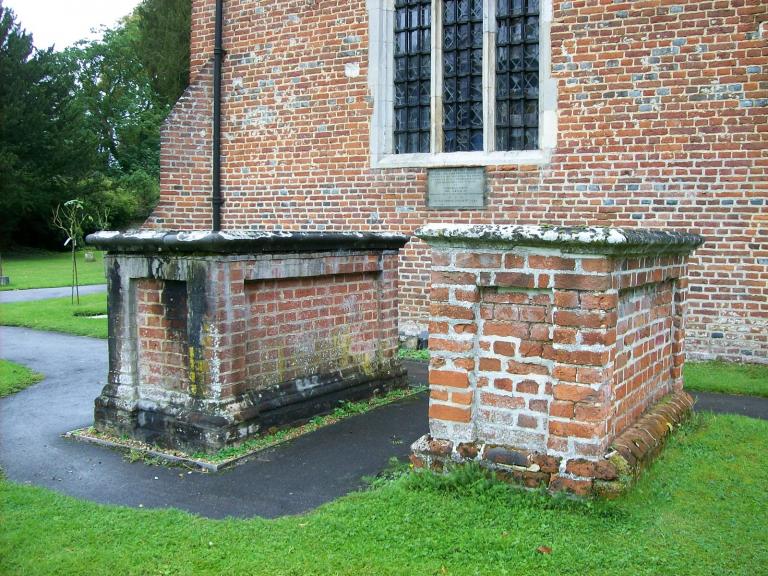
(Wikimedia Commons public domain image)
From an uncompleted manuscript on which I was working a few years ago:
The eighteenth century English poet Thomas Gray is remembered largely for one melancholy composition, entitled “Elegy Written in a Country Churchyard.” He wrote it as a meditation on the church cemetery at Stoke Poges, a village in Buckinghamshire. Looking over the graves there, he allowed himself to reflect on the people who occupied them, but who had once been as full of life as he himself:
For them no more the blazing hearth shall burn,
Or busy housewife ply her evening care:
No children run to lisp their sire’s return,
Or climb his knees the envied kiss to share.[1]
Thomas Gray’s own body has rested in the churchyard at Stoke Poges since 1771.
William Cullen Bryant’s aptly named “Thanatopsis” (“View of Death”) puts the matter very directly:
Yet a few days, and thee
The all-beholding sun shall see no more
In all his course; nor yet in the cold ground,
Where thy pale form was laid with many tears,
Nor in the embrace of ocean, shall exist
Thy image. Earth, that nourish’d thee, shall claim
Thy growth, to be resolved to earth again,
And, lost each human trace, surrendering up
Thine individual being, shalt thou go
To mix for ever with the elements,
To be a brother to the insensible rock,
And to the sluggish clod, which the rude swain
Turns with his share, and treads upon. The oak
Shall send his roots abroad, and pierce thy mold.[2]
“Everyone until recently,” remarks the literary critic [?] Ronald Blythe, “knew the actual smell of death.”[3] People died at home, surrounded by family, and their bodies rested in the family parlor while awaiting burial. Today, we die in antiseptic hospitals and are then immediately rushed away to equally antiseptic funeral homes. “Death must be denied,” says Carol Zaleski, “not because it is painful—it has always been painful—but because it signals the failure of our medical technology, the evaporation of our dream of progress and of individual self-fulfillment.”[4] Still, notwithstanding our efforts to ignore the fact, or to make light of it (literally) by “gallows humor,” or, by frenzied activity and diversions, to forget about it, every one of us knows that we will die. “A man sees death in things. That is what it is to be a man.”[5] We are unique among animals, it seems, in our awareness of death. “All our knowledge,” said the Nobel Prize-winning Belgian playwright, poet, and essayist Maurice Maeterlinck, “merely helps us to die a more painful death than the animals that know nothing.”[6] “Consciousness,” said Unamuno with this very issue in mind, “is a disease.”[7] “If consciousness is no more – as some inhuman thinker said – than a flash of lightning between two eternities of darkness, then,” he wrote, “there is nothing more execrable than existence.”[8] And those who deal with death professionally gain no exemption from it. Undertakers themselves will someday require the undertaker. As Shakespeare observed,
By medicine life may be prolong’d, yet death
Will seize the doctor too.[9]
Our few brief years of consciousness are preceded by we know not what, and followed by . . . what? “Dust you are, and to dust you shall return,” says the book of Genesis.[10] “The living,” remarks Maeterlinck, “are the dead on holiday.”[11]
[1] Thomas Gray, “Elegy Written in a Country Churchyard.”
[2] Bryant, “Thanatopsis.”
[3] Ronald Blythe, introduction to Leo Tolstoy, The Death of Ivan Ilyich, translated by Lyn Solotaroff (Toronto and New York: Bantam Books, 1981), 20. [See original.]
[4] Carol Zaleski, The Life of the World to Come: Near-Death Experience and Christian Hope (Oxford: Oxford University Press, 1996), 8.
[5] Herbert Mason, Gilgamesh: A Verse Narrative (New York: New American Library, 1970), 49.
[6] Cassell Dictionary of Cynical Quotations, 58.
[7] Unamuno, The Tragic Sense of Life in Men and Nations, 22.
[8] Unamuno, The Tragic Sense of Life in Men and Nations, 17.
[9] William Shakespeare, Cymbeline, V.v.29-30.
[10] Genesis 3:19 (JPS).
[11] Cassell Dictionary of Cynical Quotations, 58.











